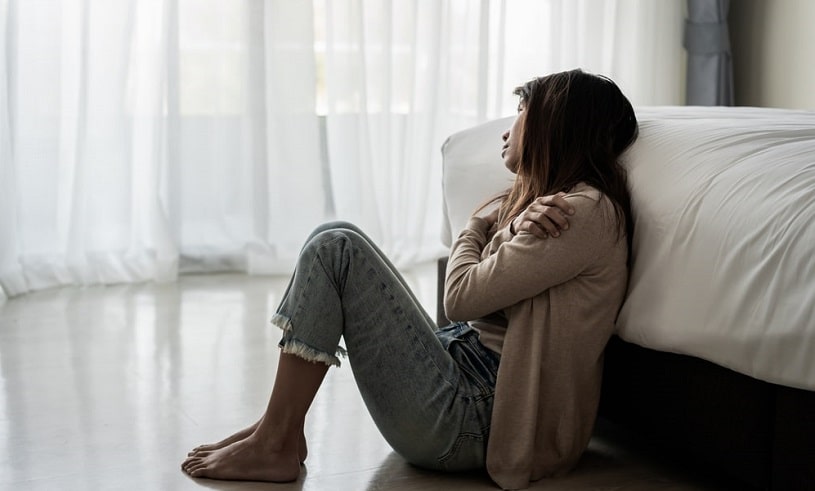Seroquel has the active ingredient quetiapine and is most often administered as an antipsychotic. The drug exerts several effects on the human central nervous system. Stopping Quetiapine abruptly may lead to serious health issues by affecting the distribution of major neurotransmitters in the brain. Seroquel withdrawal symptoms can be extreme and pose a risk to wellbeing.
Table Of Contents:
Some individuals may experience different levels of withdrawals from Seroquel due to particular health conditions. The concern with Seroquel withdrawal is that many individuals try to get off the drug without proper information or consultation with a medical professional. There are significant risks connected with stopping Quetiapine abruptly, especially for those who may be using very high doses of this medication. There are several options to Quetiapine treatment discontinuation that will ensure the patient safely gets off the drug with minimal to no side effects.
Getting Off Seroquel Cold Turkey
Quetiapine is a drug that is generally not considered to have much addictive potential or risk of dependence. However, it has been documented before, and as time moves on, more and more cases of addiction to Quetiapine are seen. These users typically discover this when they stop using the drug, and begin to experience discontinuation symptoms. These symptoms are uncomfortable enough to push them back into using the medicine, even if it is no longer medically required.

Quitting the drug can be difficult because it is potent and affects major CNS functions. The regulation of neurotransmitters and levels of dopamine, histamine, serotonin, and norepinephrine is greatly affected. It can be dangerous when a person decides to stop Quetiapine cold turkey. It is even more dangerous if one has been using Quetiapine with other substances such as alcohol or other medications, which are likely to increase the effect of the medicine, and can possibly lead to Seroquel overdose.
Quetiapine side effects can be quite intense, especially for those who may have developed a tolerance for high doses. When quitting cold turkey, withdrawals from Seroquel affect brain functions, creating a sudden disruption in an established system.
It has been confirmed that getting off Seroquel cold turkey could lead to health problems such as cardiac arrests and other dysfunctions.
Those who intend to get off Seroquel are first advised to seek medical counsel from a doctor. The physician may recommend best practices for the taper.
Seroquel Withdrawal Symptoms
Queries on how to deal with Seroquel withdrawal are numerous as users find themselves conflicted on how best to get off the medication without health implications. Many people experience withdrawals from Seroquel due to unsupervised methods of tapering or stopping cold turkey. Some individuals may try to get off the medication by concomitant use with other drugs; this can cause some unwanted Seroquel drug interactions.

Generally, coming off Quetiapine once the withdrawal begins can be quite a challenge. The medication acts as a sedative and is also administered for schizophrenia in individuals above 13. Quetiapine for bipolar disorder and other mental health issues can be highly effective. However, the downside is the possible symptoms that the patient might experience when stopping the drug.
Quetiapine Withdrawal Side Effects Include:
- Itchy red skin
- Shortness of breath
- Vomiting
- Insomnia
- Inflamed stomach
- Dehydration
- Fatigue
- High anxiety
- Depression and suicidal thoughts
- Rapid weight loss or weight gain
- Difficulty in seeing
- Kidney problems
- Low libido
- Hallucinations
- Low appetite
- Frequent urination
Factors That Can Influence The Severity of Symptoms
The Seroquel withdrawal timeline and symptoms experienced differ depending on the person and some other factors. These factors are important and are used in the management of the condition in professional treatment and rehab centers.
These Factors Include the Following:
- Genetic factors: Some people are genetically predisposed to be more susceptible to dependence. In these individuals, addiction and the consequent withdrawal may be more severe. These people tend to have close relatives with substance abuse problems.
- The dose and duration: The higher dose of the drug taken on average and the length of time it was used can affect the severity of withdrawal. Larger amounts and more extended periods of use cause the body to get more used to the drug, so withdrawal is more intense.
- Method of withdrawal: If the drug is withdrawn suddenly, known as ‘cold turkey, it tends to result in very severe withdrawals. Tapering the medication off is the preferred method as it results in less intense symptoms.
Seroquel Withdrawal Timeline
Some people experience extended quetiapine withdrawal, while some others may have very brief experiences. The Seroquel withdrawal timeline often becomes problematic because of the initial administration of the drug and the method used to taper off the medication.
Typically, the medication is administered so that it builds up from a low level to a higher level of concentration to achieve a stable dose in the body. This method of administration is essential due to the chemistry of the brain. Individuals who do not follow this pattern usually go for a high dosage on the first encounter, and a rapid dependence on the medication is formed. It leads to frequent abuse as tolerance increases. The time taken before a patient begins to feel withdrawal symptoms shorten. On average, it takes up to 14 days for discontinuation signs to disappear in a person.
The Seroquel half-life plays a significant role in the withdrawal timeline. Some patients can experience Seroquel withdrawal longer. It depends on the dosage and duration of administration. Seroquel withdrawal symptoms timeline is best suggested by a doctor for effective monitoring and to alleviate the distress.
How Should One Taper Off Seroquel?
Here is how to taper off Seroquel: A doctor should create a tailored Quetiapine withdrawal schedule to wean off the drug and prevent relapse. To do this, the doctor assesses the current dosing and the tolerance level of the patient. For instance, a patient who has been on 300 mg daily may have to cut down the dose drastically to 50 mg per week. This is entirely up to the physician after proper medical analysis of the patient’s condition. This change in medication will likely cause the development of limited withdrawal symptoms; however, it is imperative to stick to the drug tapering schedule.

If the patient desires to switch to other antipsychotics for bipolar disorder and other mental problems, it is essential to complete the tapering before taking up alternatives. It will help avoid complications such as concomitant use of Quetiapine and other medications.
Safe Home Detox Methods
There is an increasing need to find alternative medications to reduce the symptoms of stopping Quetiapine. The search has proved abortive as there is still no drug that has been certified to ease Seroquel withdrawal symptoms. The side effects of stopping Seroquel can only be managed by tapering off the medication. The first step is to wean off the drug through the help of a doctor, after which a person may switch to a different medication that can ease symptoms without causing dependency.
The tapering technique is also considered a detox process and can be done at home, under the supervision of a healthcare specialist. In many cases, an outpatient detox program is the most suitable. One may also need to make certain changes to lifestyle and diet to alleviate withdrawal symptoms further.
Here Are Some Effective Home Methods That Can Be Helpful For Withdrawal Symptoms:
- Increase the acidity of urine to expedite the excretion of drug metabolites from the system.
- As difficult as it may be at that period, exercises are highly effective and can boost metabolism.
- Drink lots of water to stay hydrated and to improve the detox process.
- Eat healthy balanced diets.
- Ask a doctor for recommended supplements that can revitalize the system and help with the overall process.
If a loved one struggles with dependency on Quetiapine, it is advisable to immediately seek medical attention from an addiction treatment specialist. They will advise the best rehabilitation program and help to find a rehab that will suit one’s needs.
Hope Without Commitment
Find the best treatment options. Call our free and confidential helpline
Most private insurances accepted
Page Sources
- Cha, H. J., Lee, H. A., Ahn, J. I., Jeon, S. H., Kim, E. J., & Jeong, H. S. (2013). Dependence potential of quetiapine: behavioral pharmacology in rodents. Biomolecules & therapeutics, 21(4), 307. https://www.ncbi.nlm.nih.gov/pmc/articles/PMC3819904/
- ASTRAZENECA CANADA INC. PART III: CONSUMER INFORMATION SEROQUEL® quetiapine fumarate immediate-release tablets, 2019. https://www.astrazeneca.ca/content/dam/az-ca/downloads/productinformation/seroquel-consumer-information-leaflet-en.pdf
- Brandt, L., Bschor, T., Henssler, J., Müller, M., Hasan, A., Heinz, A., & Gutwinski, S. (2020). Antipsychotic withdrawal symptoms: a systematic review and meta-analysis. Frontiers in psychiatry, 11.https://www.ncbi.nlm.nih.gov/pmc/articles/PMC7552943/
- Ducci, F., & Goldman, D. (2012). The genetic basis of addictive disorders. Psychiatric Clinics, 35(2), 495-519. https://www.ncbi.nlm.nih.gov/pmc/articles/PMC3506170/
- Keks, N., Schwartz, D., & Hope, J. (2019). Stopping and switching antipsychotic drugs. Australian prescriber, 42(5), 152. https://www.ncbi.nlm.nih.gov/pmc/articles/PMC6787301/
- Monahan, K., Cuzens-Sutton, J., Siskind, D., & Kisely, S. (2020). Quetiapine withdrawal: A systematic review. Australian & New Zealand Journal of Psychiatry, 0004867420965693. https://pubmed.ncbi.nlm.nih.gov/33059460/
- Cosci, F., & Chouinard, G. (2020). Acute and persistent withdrawal syndromes following discontinuation of psychotropic medications. Psychotherapy and psychosomatics, 89(5), 283-306. https://pubmed.ncbi.nlm.nih.gov/32259826/




